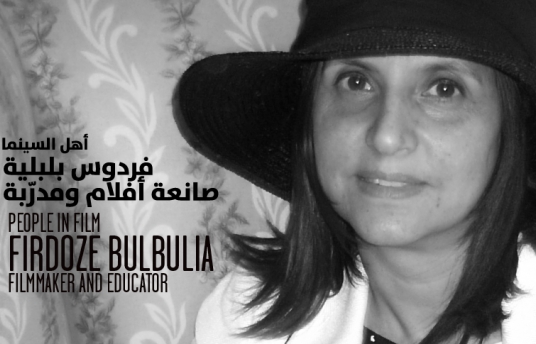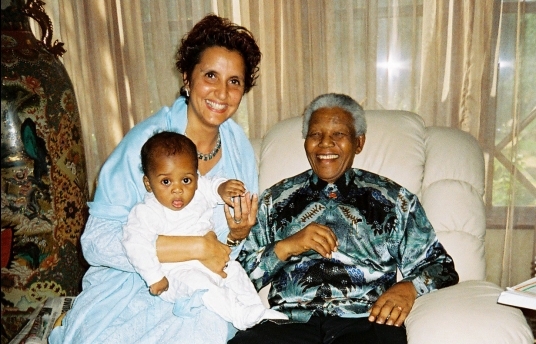People in Film: Firdoze Bulbulia
Nov 23, 2011

Firdoze Bulbulia is a director, producer, writer and educator. At the start of her career, she used theatre and art to express solidarity with women and children’s movements, The South African was something of an activist and hoped her creativity could inspire peace. She’s worked on several developmental programmes and facilitated workshops on children’s rights. She helped establish the South African Charter on Children’s Rights and represented Africa at human rights conferences internationally.
Later focusing on television, Bulbulia emphasised ideas such as development and empowerment in her productions. She’s relentlessly dedicated to harmonising society and improving relationships of all kind, spending her time trying to enlighten South Africans about their continent’s richness. While doing so, she also endeavors to improve the overall standard of entertainment. To the multi-talented Bulbulia, African unity is everything. In the spirit of the African renaissance, she has been actively involved in initiatives which unite, train and empower African producers of children’s programmes, especially with respect to women who work in the field. In March 2010, she launched ABC, a pan-African channel in Nigeria for children and is the current president of the International Center of Films for Children and Young Adults.
Her award winning films such as “Africa’s Fight against HIV-AIDS” and “African Pen Pals” are testimony to the effort she puts into her passion.
DFI: As an activist in women and children’s development, you have used theatre and the media as a means of expression. Do you truly believe that art can make a change?
Firodoze: Yes, art can definitely make a change: music, dance, poetry, and performance all have the ability to transport the audience. These mediating forms of communication provide an alternative to an academic or didactic approach to issues. A good example is theatre that deals with issues…during the apartheid era we used protest theatre as a means of communicating political issues.
DFI: You are a director and producer as well. Which job is closest to your heart?
Firdoze: I enjoy being a theatre director. I love the immediacy of the genre. It gives you a direct connection with the audience and you only have one take. The live audience and the connection with real bodies is intimidating and exhilarating, it allows for a profound connection and contact with the artists, performers and the audience. It cannot be replicated and every performance is unique.
DFI: We heard you are currently working on a new film. Can you tell us more about it?
Firdoze: Our film “Cry of Love’ is an African musical. In 2000 we produced a documentary series as part of UNICEF’s study on violence against children. We had the profound opportunity to interview children from Madagascar about domestic violence, Uganda about child soldiers and HIV-AIDS and in Ethiopia we talked to them about marriage by abduction. The documentary was shown internationally and parts were screened on CNN. It brought attention to atrocities in Africa, but unfortunately not much has changed.
After our third film we wanted to focus on the youth and were concerned by the xenophobic attacks that plagued South Africa in 2008) It shocked us. As African filmmakers, we could not believe what was happening on our doorsteps. We have spent so much time in different African countries and have always been welcomed, but in 2008 our world shattered and we have not recovered from that trauma. We thought it is important to use film as a medium to share these concerns but also to use arts and culture as the mediator and find a balance, a way in which young people can leverage a new dawn.
Our concern is, if we are unable to find solutions for Africa, who will? We have to offer new hope, love, peace and a future that our youth can work towards.
DFI: As the head of jury in many international festivals for children, what is it that you look for in a film?
Firdoze: I look for the heart of the story. Content is still king, as long as the story is truthful, sincere and honest. I also look for stories from the ‘majority world’ (Africa, Asia and Latin America). I look for alternative stories, stories that go beneath the surface, that offer a new world, a new vision, a new understanding, stories in which children are respected and given a voice.
DFI: How do you see the quality of work in commercial television networks for children lately?
Firdoze: Commercial television networks are making huge returns on children’s content. They produce high-quality content but often very superficial and mostly entertainment. It is necessary to also provide some depth in children’s content and to produce for different markets. Globalisation is a huge concern when it muffles the voices of ‘the other’. We need to offer children a view of the world and they must become aware of the world around them, they cannot live in a bubble.
DFI: What workshops do you conduct for children? And do parents get involved?
Firdoze: We train producers of children’s content and we also have a young media team that trains their peers in producing content by children for children and by the youth for youth. We have not had parents in these workshops, but many adult producers and directors are parents so they benefit from these workshops too.
DFI: Your journey has been so diverse. What is your most memorable moment in your career?
Firdoze: There are a few. In 1997-98, when I interviewed former President Nelson Mandela when Fort Hare University celebrated 80 years, thereafter we were invited by the African National Congress to cover his 78th birthday. We produced a documentary and a black and white photographic coffee table book, “Council of the Elders”. Nelson Mandela wrote the foreword. During the period of filming, we came very close to many veterans of the South African Liberation struggle; it was truly an honor to meet those who fought for our freedom.

Firdoze Bulbulia with Nelson Mandela
In 2000 we produced a 13-part series on “Africa’s Fight Against HIV-AIDS”. We filmed in more than 13 African countries and worked closely with former Presidents Kenneth Kaunda from Zambia and Jerry Rawlings from Ghana. We experienced the stench of death in Ethiopia when we witnessed some of our key subjects succumbing to AIDS. It made me take a one-year sabbatical to pursue my Masters in African Studies at Ohio University in the USA. We presented the series in The Hague, Netherlands and managed to raise a substantial amount of funds for HIV-AIDS treatment.
DFI: Who inspires you the most in your work?
Firdoze: I am inspired by the young people we work with, the producers we offer training and mentorships to and the youth who are ensuring ABC in Nigeria is on air even when I am in South Africa.
DFI: What is your message to the youth and adults interested in producing work for children?
Firdoze: There is a great need for people who are committed, honest and interested in making the world a better place for all children. Focus on your own communities and children. Think global but act local! Too many people want to help children in remote communities beyond their own borders. My plea would be look at the situation in your backyard and make a difference. Charity does begin at home.